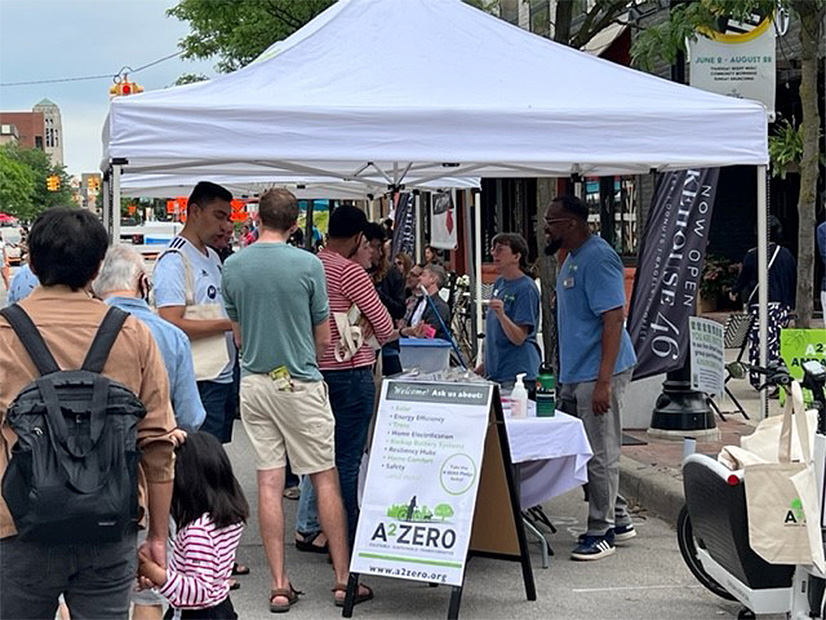
ANN ARBOR, Mich. – Ann Arbor Mayor Christopher Taylor appears on his way to a third term after cruising to victory with 61% of the vote in the August Democratic primary; Republicans did not field a candidate.
Whether voters will also back his proposal for a 1 mill property tax increase to fund climate projects on Nov. 8 is less certain.
There is a “moral imperative to act on climate change,” Taylor said in an interview, repeating a phrase he has used since proposing the tax increase a year ago. While some suggest voters may be feeling “millage fatigue” after approving several city and school district tax increases in recent years, Taylor said he is confident residents and business owners will recognize the need to pay for actions to meet the city’s goal of reaching net zero emissions by 2030.
“I hope and believe Ann Arbor voters recognize we can’t get the benefits of climate restoration without resources,” Taylor said. “We’re all gonna pay for climate change,” he said, whether civilization takes steps to “counterbalance climate change,” or to protect itself from its impacts.
The tax, which would add $153 annually for an average property with a taxable value of $153,000 (half of the average fair market value of $306,000), would be in place for 20 years. In 2021, Ann Arbor property owners paid 50 mills.
The tax would raise an estimated $6.8 million in the first year. City Council passed a “shadow budget” saying it would spend
- $1 million on compost programs and expanded recycling for “a zero waste, circular economy;”
- $2 million on community solar, district geothermal and discount pricing of renewable energy;
- $750,000 on services to help low-income residents save money and improve weatherization;
- $500,000 on energy efficiency for residents and businesses;
- $500,000 on neighborhood and community preparedness for climate change, including tree planting, rain garden installations and heat and flood mitigation;
- $1 million to expand walking paths and bike lanes; and
- $1 million to expand electric vehicle charging access — with an emphasis on renters and multi-family housing — and support electrification of appliances and heating and cooling.
The city currently spends about $2 million annually on climate measures, half from a Washtenaw County rebate and half from the city’s general fund.
Taylor said helping the city’s low-income Southeast Bryant neighborhood is a priority. Taylor said the city’s efforts to rebuild the tree canopy has been lacking in lower income areas. He also expressed a desire to help low-income households acquire more efficient appliances and access to renewable energy.
After winning his primary in August, Taylor’s only opponent in the liberal-leaning home of the University of Michigan is an independent. Taylor also appears poised to increase his 7-4 margin on council, as three candidates on his ticket defeated incumbents opposed to him.
City Council authorized a referendum on the tax last December. Ann Arbor would be one of the few communities in the nation to have a tax dedicated to climate action. Boulder, Colorado, voters enacted a similar tax in 2006 that raises about $1.8 million annually. No other localities in Michigan are considering such a proposal.
Tax increases have often proven contentious in Michigan, but the campaign on the tax proposal has been relatively quiet. There is an organization backing the proposal, A2 Climate Voters, which has gathered campaign donations. The city, which has a webpage backing the tax, spent nearly $20,000 to mail a postcard describing the proposal to some 56,000 city addresses.
There is no actively organized opposition to the tax proposal. One of the few, criticisms of the proposal came from a co-host of a podcast that deals with Ann Arbor issues and politics. The co-host said local residents may feel millage fatigue after voting in recent years on a sidewalk proposal and a large school improvement proposal. Even though she raised the criticism, the co-host also said she would probably vote for the proposal.
Missy Stults, Ann Arbor’s sustainability and innovations director, acknowledged that property owners don’t welcome tax increases, but said there are few other ways for local communities in Michigan to raise funds needed for projects. “We’ll see” if the city’s voters are tired of millages, she said.
Taylor expects the campaign will heat up with less than a month left to the election. More mailings are planned, and pro-proposal yard signs will be distributed, he said.
Taylor said businesses have a range of opinions on the proposal. But businesses also understand that all have to take action to combat climate change and want to be part of a community that meets its environmental responsibilities, Taylor said.
“On balance, everyone recognizes we need to do our part,” he said.
Taylor said he has heard nothing from other municipalities about the tax proposal. If the tax passes, Taylor said, he might get a phone call from another official considering similar action.
If the voters reject the tax, Taylor said, he expects the phone to stay quiet.


